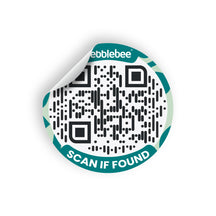It's Earth Week!
Did you know that losing stuff isn’t just annoying but also a waste problem?

Picture this... your phone slips from your pocket on the train. By the time you notice, the doors have closed and the device is already miles away. You are frustrated, but the planet takes the bigger hit. That single phone required cobalt from somewhere like the Congo, lithium from Chile, plastics from refineries, and enough energy to leave roughly 67 kilograms of carbon dioxide hanging in the atmosphere.
Now multiply that feeling by the seventy million smartphones that go missing every year. Fewer than one in ten are ever returned to their owners.
The Hidden Damage We Rarely Talk About
-
Phones tossed, not lost
Americans discard around 416 000 cell phones every day according to the U.S. Environmental Protection Agency. Most end up in landfills where metals and batteries can leach into soil and water.
-
Suitcases that never reunite
Airlines mishandled about twenty six million bags in 2022, an average of 7.6 bags for every thousand passengers. Many of those bags and their contents are never recovered.
-
Auto lockouts are more than just inconvenient
 In 2024 the American Automobile Association handled more than 27 million roadside calls. AAA notes that about one in ten of those requests involved drivers locked out of their vehicles, which works out to nearly three million key‑related emergencies in a single year. That works out to ~74,000 tonnes of CO₂ every year, roughly the same annual climate footprint as 16 000 gasoline cars, just unlocking doors.
In 2024 the American Automobile Association handled more than 27 million roadside calls. AAA notes that about one in ten of those requests involved drivers locked out of their vehicles, which works out to nearly three million key‑related emergencies in a single year. That works out to ~74,000 tonnes of CO₂ every year, roughly the same annual climate footprint as 16 000 gasoline cars, just unlocking doors.
-
A mountain still growing
 The United Nations recorded a record sixty two million tonnes of electronic waste in 2022. It is also rising five times higher than document waste!
The United Nations recorded a record sixty two million tonnes of electronic waste in 2022. It is also rising five times higher than document waste!
Why loss prevention is a climate solution

-
Every item rescued is one less item manufactured
Manufacturing is where most carbon emissions and resource extraction occur. Keeping a phone for an extra two years saves the same emissions as skipping several cross‑country flights.
-
Less pressure on fragile recycling systems
Recycling electronics is complex and expensive. Preventing loss keeps heavy metals and plastics out of informal dumps where they pose health risks.
-
Conservation of critical minerals
Elements like cobalt, nickel, and rare earth metals have limited reserves. Extending product life stretches these resources further.
Simple habits that make a difference

- Create a launch pad at home where keys, wallet, and phone always live.
- Use device‑finding features built into modern phones or Pebblebee's Phone Finder.
- Attach a small Bluetooth tracker with a rechargeable battery to items that travel with you.
On this Earth Day
 Imagine if even ten percent of those seventy million lost phones found their way back into pockets instead of landfills?! That single change would keep the equivalent of four hundred and fifty thousand tonnes of carbon dioxide from ever being emitted, roughly the annual footprint of a mid‑size city. Keeping track of our stuff may feel like a personal convenience, yet it is also one of the simplest climate actions we can take.
Imagine if even ten percent of those seventy million lost phones found their way back into pockets instead of landfills?! That single change would keep the equivalent of four hundred and fifty thousand tonnes of carbon dioxide from ever being emitted, roughly the annual footprint of a mid‑size city. Keeping track of our stuff may feel like a personal convenience, yet it is also one of the simplest climate actions we can take.







